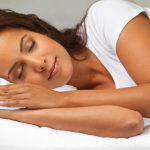Sleep Well, Age Well
The snooze button—one of the greatest inventions. For most people, the blaring alarm clock prompts a dreadful sigh of annoyance and a moan of exhaustion. “Five more minutes,” you tell yourself and press that heavenly button; but when the beeping starts again, you still feel groggy and deflated. Sound familiar?
Adults on average need 7 to 9 hours of sleep each night, but few actually get that much shut-eye. According to the National Center on Sleep Disorders, 90 million people have difficulty sleeping which can greatly affect health and wellness and promote the development of chronic disease and accelerated aging.
Sleep is not a passive process; in fact, it is a very active time for your body to grow, develop, and recover. If sleep is cut short, the body does not have enough time to repair muscle, consolidate memories, or release hormones needed for growth and appetite regulation. Studies show that lack of horizontal time impairs these physiological processes and may lead to weight gain, accelerated aging, or disease.
If you ask someone what they are doing to lose weight, it is highly unlikely that their answer will be to sleep more. However, evidence has linked inadequate sleep with obesity. A recent study of 123 obese adults showed that those who reported obtaining a more restful sleep lost more weight than those who did not (1). Every additional hour of sleep was associated with a 0.7 kilogram loss in body fat. So, how does restless sleep lead to excess fat?
It is possible that living against our natural human clock is the culprit. Thanks to Thomas Edison and the invention of the first light bulb in 1879, we can now work, socialize, and play 24 hours a day, 7 days a week. A paper published in Bioessays suggests defying the natural “circadian” rhythms (which influence our sleep wake cycle) can disrupt the systems in the brain and hormones that regulate metabolism, increasing the risk for obesity and related disease such as diabetes.
In addition to weight maintenance, sleep may also help slow the aging process. Telomeres, the end-caps on DNA strands that protect it from damage, appear to be shorter and thus less protective in those who have difficulty catching Z’s. In the Journal of Aging Research, scientists found that women who reported poorer quality sleep had significantly shorter telomeres, indicating a higher risk for age-related disease (2). Lifestyle plays a major part in healthy aging, with quality sleep at the forefront.
As a result of excess weight gain and telomere shortening, you are more at risk for developing age-related diseases (such as diabetes and hypertension) if you do not get enough quality sleep. Even short-term sleep deprivation can have a significant effect on your ability to make decisions, concentrate, work, or exercise at optimal levels.
The bad news is that if you currently have difficulty sleeping, it may only going to get worse. Science shows that our “sleep architecture” changes with age—50 percent of people over the age of 60 say that they have difficulty sleeping. Ever notice the older men sitting outside of a department store in the mall, so deep in sleep that they are snoring absurdly loud? Older people need just as much sleep as all adults (7 to 9 hours), but they are more likely to wake frequently throughout the night. That is one reason why many nap during the day—to catch up on the sleep they missed.
When you sleep, your body goes through alternating patterns of REM (rapid eye movement) and NREM (non-rapid eye movement). This cycle repeats itself about every 90 minutes. During NREM, the onset of sleep begins and is evident by regular breathing and a drop in body temperature. Slowly, blood pressure drops, muscles are increasingly relaxed, tissue and growth occurs, and energy is restored. Hormones (such as the Growth Hormone) are released to promote growth and development. After about 90 minutes of sleep, your body enters REM (rapid eye movement) which provides energy to your brain, support for day time performance, and complete rejuvenation. Restless sleep interrupts these cycles and interferes with the body’s natural process of healing, restoring, and rebuilding.
To avoid sleep-walking through the day, make your health a priority and get the recommended amount of sleep needed each night. Isagenix Sleep Support & Renewal system can help by increasing natural sleep time, resetting the body’s sleep-wake cycle, and promoting health aging of the brain. The snooze button will no longer be needed when you are getting quality sleep—instead, you will wake up feeling refreshed and renewed, and your body will thank you.

No comments:
Post a Comment